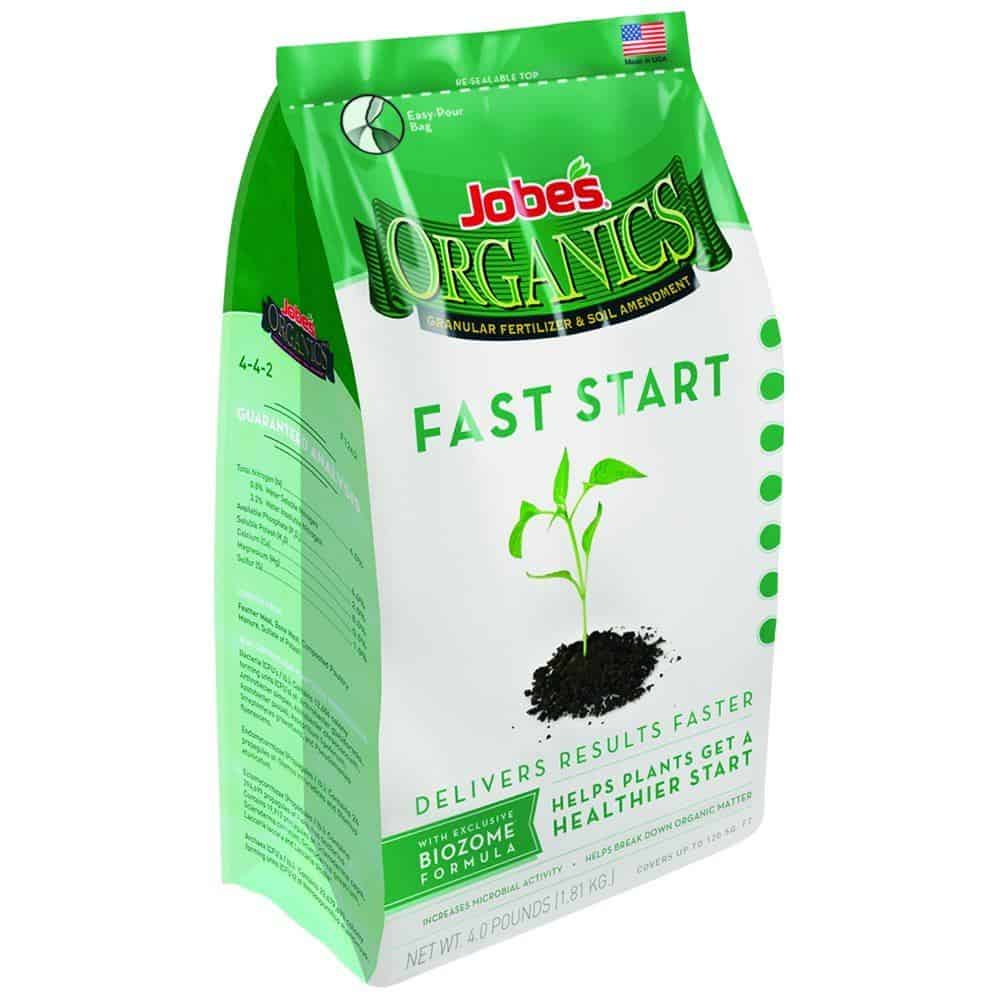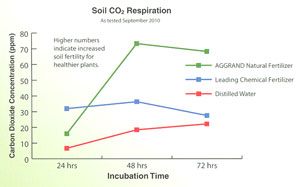Jobe’s: Organic Fertilizer Manufacturer
OMRI Listed
Why You Should Switch to Organic Fertilizer Manufacturers
- Lower Cost Brands
- Better Results and Healthy Plants
- Try Foliar Feeding Options
- Improve Soil Health
- No Nitrate Runoff
- Nearly Impossible to Burn Plants


Jobe’s Organic Fertilizer
Jobe’s Fertilizer is a natural product for farms, landscapers, golf courses, and gardeners who want to be responsible and use organics. Fertilizer for Less is proud to bring you this product review of their 4-4-4 Jobe’s Organics Fast Acting Granular Fertilizer. Jobe’s includes some of the highest quality ingredients into their products. They conduct detailed field and greenhouse experiments to validate the use of each ingredient. Combined with fast shipping from Amazon, this product is hard to beat!
Homeowners, lawn care specialists, and commercial growers alike are beginning to recognize just how important environmental responsibility is. As we tend to our gardens, lawns, and crops, it is important to remember the impact nitrate run-off has on our lakes, rivers, and fisheries. Jobe’s Fertilizer provides an economical option that also addresses these related concerns, while being proven effective through the scientific method.

All-Purpose Fertilizer from Jobe’s
First off, they have OMRI certification on the packaging. So you know their products are held to a high standard. Then they have excellent product application rates listed all over their site and on Amazon. So, we’re pretty impressed so far. But then we learned that this all-purpose fertilizer also includes Biozome, a unique and proprietary blend of beneficial soil microorganisms. To me, this speaks volumes.
Including beneficial fungus and bacteria will help grow soil biology and unlock inorganic nutrients in the soil. So, I highly recommend Jobe’s All-Purpose 4-4-4 for gardeners, farmers, and anyone interested in healthy plant care. But to me the most important thing to look for in Jobe’s or any other fertilizer is that OMRI label they proudly display on the bag. Why? I think organic is a must for any serious gardener. It provides the best yields, and I’d like to share some real-world results that seem to back up that claim:
Long-Term Benefits of Organic Fertilizers
Traditional growers know that running the same crop each year in the same soil will lead to pest infestation or disease. Midwest farmers tend to alternate corn and soy in order to combat this problem. Soybeans fix nitrogen into the soil so that corn crops in the subsequent season require less fertilizer. Charles, a farmer in Iowa, decided to test the effectiveness of an organic fertilizer by continually planting soy on a 10 acre plot for several years.
He added 1 gallon per acre of a 4-4-4 Natural Fertilizer and didn’t make any changes to tillage method or amendments. Later on in the season, he applied a foliar spray of a Natural Kelp and Sulfate of Potash (1/2 gallon per acre) and another gallon of some 4-4-4 Natural Fertilizer. He did that for five consecutive years of soy on the same plot! In the past he averaged 40 bushels per acre. The first year of this experiment yielded 42. Then 54, 62, and finally 67 bushels per acre by year four.
Natural Fertilizers Work Better Over Time
To me, this experiment proves two things. For starters, I think we sacrifice long-term soil health for immediate gains when we use chemical fertilizers. This experiment clearly proves that it takes time to build soil health. However, if you have a long-term mindset your farm will benefit greatly within a few short years by switching to natural fertilizers.
Another thing that I would like to point out is that these results were in spite of a lack of crop rotation. While soy might add small levels of nitrogen, it removed about a pound of phosphorus per bushel each season. In spite of this fact, the test crop managed to provide a greater harvest in each successive planting. I find these real-world results to be inspiring. It proves the value of switching to an Organic and Natural Fertilizer.
Nitrogen Fixation: A Sustainable Fertilizer Approach
As an essential ingredient in the production of chlorophyll, protein, and enzymes Nitrogen (N) is very important for plants. You have to find a balance. On one hand, insufficient N can lead to stunted growth. On the other, too much luxury uptake will result in weak cell walls and watery tissue. This can lead to more pest problems. It is especially true in the case of turf where chinch bugs tend to aggressively attack over-fertilized grasses. And it gets worse…
Oh my stars! Before you know it, you’re dealing with completely burnt grass! If you aren’t careful, the sun will burn grass that’s had too much nitrogen applied. Those multi purpose granular fertilizer products made from conventional chemicals require careful application
Nitrogen does not exist naturally in soil. It must be absorbed from the atmosphere. However, your plants are unable to use nitrogen from the air until it is “fixed” into ammonium or nitrate by bacteria or algae living in the soil. Healthy soil with adequate bacteria is able to fix between 50 to 400 lbs. of nitrogen per acre each year! Here’s the problem: Chemical fertilizers are full of salts which kill bacteria. So, farmers who rely on those products are stuck in the cycle of adding more amendments each year to make up for this loss. Alternatively, farmers who use a natural product like Jobe’s Fertilizer are able to feed soil biology and rely more on our microscopic allies as time goes by.

Chemical Fertilizers: Proven to Disrupt Nitrogen Fixation
Artificial nitrogen sources use the Haber-Bosch process of reacting hydrogen and nitrogen under heat and pressure to form ammonium. This process did spark the exponential growth in human population. However, it is not sustainable in the long-term. Additionally, a study by (Fox, et al, 2007) shows us that chemicals in nitrogen fertilizers actually interfere with the ability of plant roots to interact with Rhizobium for the fixation of atmospheric nitrogen.
More About Rhizobium
So, what does this tell us? For starters, rotating soy through actually has less of a benefit to corn that it would if you used natural fertilizers. In addition, you can expect to rely more and more on chemical fertilizers each year as biological activity is disrupted. Organic Fertilizers actually help increase the interaction between plants and Rhizobium, thereby increasing available N each season. Organic allows us to turn the green revolution brought about by chemicals into a green renaissance of healthier food and cleaner waterways.
Benefits of Working With Organic Fertilizer Manufacturers
Lower Cost of Natural Fertilizer Products
Jobe’s natural plant foods are a multipurpose formulated to promote vigorous growth, increased root development and improved stress and disease tolerance on vegetables, fruits, trees, field crops and houseplants. It’s formulated to give new plants a fast start with better drought and disease tolerance.
Improve Soil Health with Fertilizer
Chemical fertilizers have a lot of salt. It’s a result of the manufacturing process. That salt reduces the population of healthy soil microorganisms and causes erosion over time. Organic fertilizer manufacturers offer a product that does the opposite. Because they are using ingredients like fish emulsion, Jobe’s actually increases soil life over time. The benefit to you is more natural fertility in your soil. In a single acre of healthy soil, you can expect earthworms to add 700 lbs. of nitrogen! That’s FREE fertilizer!
No Nitrate Runoff
America’s lakes, streams, and rivers are struggling to deal with the high concentrations of industrial agricultural pollutants that wash into them each year. In fact, there is a dead zone in the Gulf of Mexico where very little life is able to survive due to these pollutants. Because it is all natural, Jobe’s Organics does not cause waterway pollution. Protect our fisheries. Work with a natural liquid fertilizer like Jobe’s Organics and make sure your children can enjoy a weekend trip to the local lake. Please pass on healthy waterways with abundant fish to our future generations.
Follow Us On Facebook
Increased Microbial Activity with Organic Fertilizers
Natural Fertilizer raises bacterial activity in your soil. So, you have stronger and healthier plants. Aerobic microorganisms like native bacteria, fungi and protozoa thrive on carbon sources. This causes a process commonly referred to as mineralization. Mineralization builds plant-available nitrogen and phosphorus within the soil structure. This helps plants grow and develop when you switch to an organic and natural fertilizer manufacture.
To determine the amount of bacterial activity in soil, the carbon dioxide (CO2) produced by microorganisms is measured. Higher levels indicate more bacterial activity, hence more potential nitrogen and phosphorus available to plants. So, feed the soil and the soil will feed you.
Although chemical-based fertilizers have high nitrogen, phosphorus and potassium levels, plant-use efficiency can be very low. In addition, they are often high in soluble salts that are toxic to soil bacteria and help create compaction and nitrification conditions, leading to plant stress. Research shows that soils treated with organic fertilizer hold increased CO2 levels compared to leading chemical fertilizers. And this means healthier plants because of increased bacterial activity (see graph).

Applications of Organic Fertilizers
Natural Based Fertilizers are recommended for, but not limited to, the following crops:
| ||
| ||
|
| |
| ||
|
| |
|
| |
|
|
Application rates will vary with different plant/crop type, weather conditions, and soil type.
Thanks for Viewing Our Organic Fertilizer Review Page
Don’t Forget to Visit Our Store!
View Recent Posts
Fertilizing Fruit Trees – The Smart Way
Homemade Fertilizer for your Garden
Helpful Tips on Repairing Burnt Grass






